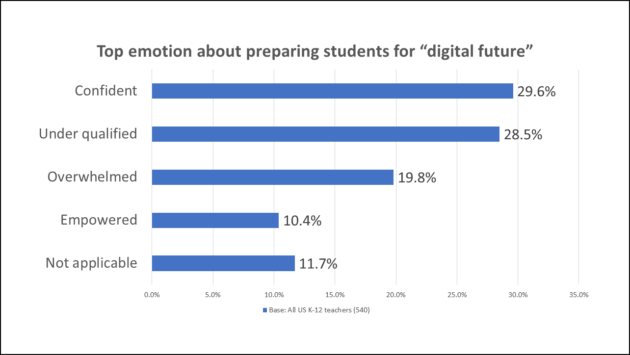
Underqualified. Overwhelmed. Underfunded. Those are among the reasons teachers give, in a new survey, as to why they or other educators at their school don’t teach students computer science — on the first day of the annual Computer Science Education Week.
And in a move partly designed to shore up educators, Microsoft is commiting a new $10 million to help Seattle-based computer science nonprofit Code.org provide teachers with professional development about the subject, as well as promote computer-science friendly policies at the state level, between now and 2020.
It’s not that K-12 educators don’t think computer science is important. The survey, conducted by YouGov in November and released by Microsoft on Monday, found 88 percent of the 540 U.S. K-12 teachers asked agreed that computer science is critical to students’ success in the workplace. Teachers also see other, non-coding benefits to a computer science education: 38 percent said it could help students with general problem solving, and 31 percent identified better logic and reasoning skills.
And as to the pure coding part of computer science? In the survey, 83 percent of teachers think coding can build student creativity, too.

But teachers tend to hit the wall when it comes to their own feelings about preparing their students for a more “digital future.” Of those surveyed, 40 percent are positive (“empowered” or “confident”). However, more are not-so-good: 29 percent feel underqualified, and 20 percent feel overwhelmed.
When it comes to the actual computer science instruction, 19 percent said their students aren’t taught computer science at all. Reasons given include that it’s not part of the school curriculum (59 percent), there’s no money for it (28 percent), it’s not measured on student tests (25 percent), or there simply wasn’t anyone in the school trained or qualified in computer science (19 percent).
Overall, just under 20 percent of the teachers surveyed said they felt “very confident” in their understanding of what “computer science education” encompasses in K-12.

This isn’t the first survey that Microsoft has released that covers computer science education. An earlier survey in August on what parents think of classroom tech touched on computer science, too, and found that 50 percent of parents thought coding and computer science were beneficial to their kids getting a job.
Back then, as now, the survey asked if federal and state governments were doing enough, either to equip schools to build kids’ digital or computer science skills. A majority of teachers and parents didn’t think so.
Perhaps not surprisingly, 79 percent of teachers surveyed thought “big tech companies” like Google, Apple, and — naturally — Microsoft should be involved in helping build students’ computer science skills. The earlier survey pegged it at 75 percent of parents that thought big tech should be helping schools build kids’ digital skills.
So what does Microsoft see as a proper role of big tech companies, like it, in providing this kind of support?
“Microsoft is committed to supporting computer science by investing deeply in programs to help schools grow their computer science classes, creating curriculum and tools to teach computer science in engaging and creative ways, as well as working hand-in-hand with nonprofit partners and educators,” Mary Snapp, corporate vice president and head of Microsoft Philanthropies, told GeekWire. “We do this by running our own CS education programs, such as TEALS, and partnering closely with groups like Code.org that are leading the effort to broaden access to computer science education.”
TEALS (Technology Education and Literacy in Schools) is Microsoft’s program, founded in 2009, to pair computer science professionals working in the technology industry with classroom teachers to team-teach computer science.
The new $10 million in financial support for Code.org announced Monday has two stated goals by 2020, according to Microsoft: Ensure every state will have passed policies to expand access to computer science, and that every school in the U.S. will have access to Code.org teacher professional development. Microsoft notes it is Code.org’s largest corporate sponsor and was a founding supporter of the nonprofit.

And for this week’s efforts, Microsoft has created a new Minecraft Hour of Code tutorial in coordination with Code.org called Voyage Aquatic, based on the Minecraft: Education Edition module, Update Aquatic, that was introduced in June. The Minecraft Voyage Aquatic tutorial is one of what Code.org says are about 550 one-hour tutorials available in over 45 languages for use by students.
More than 180,000 Hour of Code events had been scheduled as of Friday around the world for 2018’s Computer Science Education Week, begun in 2009 and now organized by Code.org. The week is held to coincide with the Dec. 9 birthday of computing pioneer Admiral Grace Murray Hopper and, for the last several years, has been centered on the Hour of Code concept to gets students started with computer science.
As awareness of coding and computer science has permeated the culture over the past nine years, the objective of Computer Science Education Week has evolved, too.
“Early on, CS Education Week was a rag-tag effort by hundreds of CS teachers,” Hadi Partovi, CEO of Code.org, told GeekWire. “In 2013, it became a global celebration, thanks to the Hour of Code campaign which introduced hundreds of thousands of classrooms to coding for the first time. Now that 1 million teachers have tried teaching CS, we’re shifting the focus to long-term sustainable change in curriculum, involving districts and governments.”



